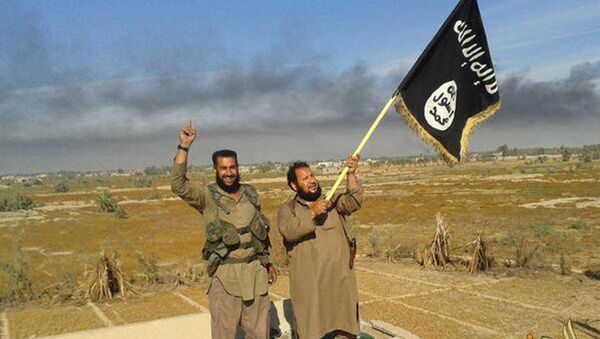WASHINGTON (Sputnik) — US national security state policymakers still see Russia, China and Iran rather than the Islamic State as their main enemies, leading them to pursue confused and contradictory efforts against the terror group, analysts told Sputnik.
"[US Defense Secretary] Ashton Carter's statement that ‘Russia and China are a bigger threat than ISIS [Islamic State],’ is at the core of why the US is targeting ISIS foes," California State University Emeritus Professor of Political Science Beau Grosscup, an author and terrorism analyst, told Sputnik.
In the US national security state's corridors of power, the Post-Cold War strategic goals of big power politics matter most and far outweigh fighting the Islamic State, Grosscup explained.
"Underneath these two strategic goals, the United States finds itself in numerous contradictions," he continued about the context of the fight against the Islamic State, which is also known as Daesh.
The Obama administration is currently fighting the Islamic State in Iraq, while supporting an Iran-supported Iraq government, and is also supplying "moderate" al-Qaeda-affiliated rebels such as the Nusra Front against the Assad government in Syria, Grosscup pointed out.
"As for ISIS [Islamic State], given its larger strategic goals, the national security state is in a holding pattern, using the Russians, Hezbollah, French, British and Iran and a few smaller powers (Jordan) to fight the Sunni states' proxy," Grosscup stated.
Meanwhile, the Neoconservative-dominated national security state's structure in Washington is trying to negotiate a regime change in Syria that would allow the battle against the Islamic State to begin in earnest under US leadership, Grosscup added.
"One key strategic goal is to prevent the rise of a competing power. Russia and China as well as the European Union alone or in combination threaten the US position as the sole architect of the 21 Century New World Order," he argued.
The Obama administration was encouraging the export of US oil to keep prices down to hurt Russia and Venezuela while doing Saudi Arabia's bidding, and it is also supporting the Saudis’ anti-Shiite agenda, Grosscup observed.
"Protecting the privileged position of the US dollar as international reserve currency drives much of this policy as it did the ousters of Saddam Hussein and Muammar Gaddafi," he continued.
This US consensus based on unconditional support for Saudi Arabia and Israel also explained Obama’s refusal to even acknowledge Hezbollah’s role in effectively fighting the Islamic State, US historian, author and policy analyst Gareth Porter told Sputnik.
"The Obama administration as not softened its rhetorical position on Iran's relationship with Hezbollah one bit," Porter acknowledged, because of the Iran nuclear agreement, just as the Saudis have predicted.
US hostility towards Syria, Iran and Hezbollah, despite their key roles in fighting the Islamic State, remained a firmly-fixed political position in Washington that has bureaucratic and diplomatic as well as domestic political foundations, Porter added.

